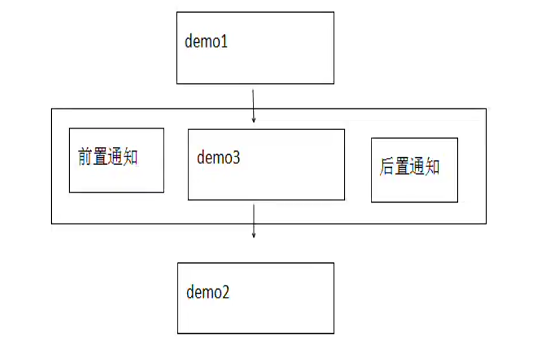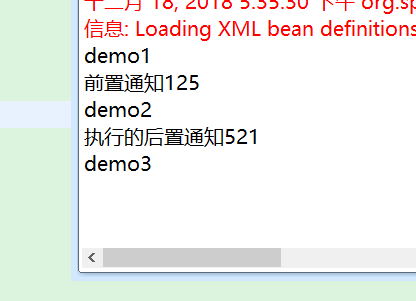Spring
1、AOP:中文名称面向切面编程
2、英文名称:(Aspect Oriented Programming)
3、正常程序执行流程都是纵向执行流程
3.1 又叫面向切面编程,在原有纵向执行流程中添加横切面
3.2 不需要修改原有程序代码
3.2.1 高扩展性
3.2.2 原有功能相当于释放了部分逻辑,让职责更加明确

4、面向切面编程是什么??
4.1 在程序原有纵向流程中,针对某一个或某一些方法添加 通知,形成横切面过程,就叫做面向切面编程。
5、常用概念
5.1 原有功能:切点,pointcut
5.2 前置通知:在切点之前执行的功能 before advice
5.3 后置通知:在切点之后执行的功能 after advice
5.4 如果切点执行过程中出现异常,会触发异常通知 throws advice
5.5 所有功能总称叫做切面
5.6 织入:把切面嵌入到原有功能的过程叫做织入
6、spring提供了2种AOP实现方式
6.1 Schema-based :
6.1 每个通知都需要实现接口或类
6.2 配置spring配置文件时 在<aop:config>配置
6.2 Aspectj
6.2.1 每个通知不需要实现接口或类
6.2.2 配置spring配置文件是在<aop:config>的子标签
<aop:aspect>中配置
Schema-based实现步骤:
1、导入包

2、新建通知类
2.1 新建前置通知类
2.1.1 arg0:切点方法对象 Method方法
2.1.2 arg1:切点方法参数
2.1.3 arg2:切点在哪个对象中
public class MyBeforeAdvice implements MethodBeforeAdvice{ @Override public void before(Method arg0, Object[] arg1, Object arg2) throws Throwable { System.out.println("前置通知125"); } }
2.2 新建后置通知类
2.2.1 arg0:切点方法返回值
2.2.2 arg1:切点方法对象
2.2.3 arg2:切点方法参数
2.2.4 arg3:切点方法所在类的对象
public class MyAfterAdvice implements AfterReturningAdvice{ @Override public void afterReturning(Object arg0, Method arg1, Object[] arg2, Object arg3) throws Throwable { System.out.println("执行的后置通知521"); } }
3、配置spring配置文件
3.1 引入aop命名空间
3.2 配置通知类的<bean>
3.3 配置切面
<?xml version="1.0" encoding="UTF-8"?> <beans xmlns="http://www.springframework.org/schema/beans" xmlns:xsi="http://www.w3.org/2001/XMLSchema-instance" xmlns:aop="http://www.springframework.org/schema/aop" 配置命名空间 xsi:schemaLocation="http://www.springframework.org/schema/beans http://www.springframework.org/schema/beans/spring-beans.xsd http://www.springframework.org/schema/aop http://www.springframework.org/schema/aop/spring-aop.xsd"> <!-- 配置通知类对象,在切面中引入 --> <bean id="mybefore" class="com.bjsxt.advice.MyBeforeAdvice"></bean> <bean id="myafter" class="com.bjsxt.advice.MyAfterAdvice"></bean> <!-- 配置切面 --> <aop:config> <!-- 配置切点 --> 如果希望匹配任意方法参数 (..) <aop:pointcut expression="execution(* com.bjsxt.test.Test.demo2())" id="mypoint"/> * 通配符,匹配任意方法名,任意类名,任意一级包名 <!-- 通知 --> <aop:advisor advice-ref="mybefore" pointcut-ref="mypoint"/> <aop:advisor advice-ref="myafter" pointcut-ref="mypoint" /> </aop:config> <!-- 配置Demo类,测试使用 --> <bean id="test" class="com.bjsxt.test.Test"></bean> </beans>
4、编写测试代码
public class Demo { public static void main(String[] args) { ApplicationContext ac=new ClassPathXmlApplicationContext("applicationContext.xml"); Test test = ac.getBean("test",Test.class); test.demo1(); test.demo2(); test.demo3(); } }
5、运行结果
